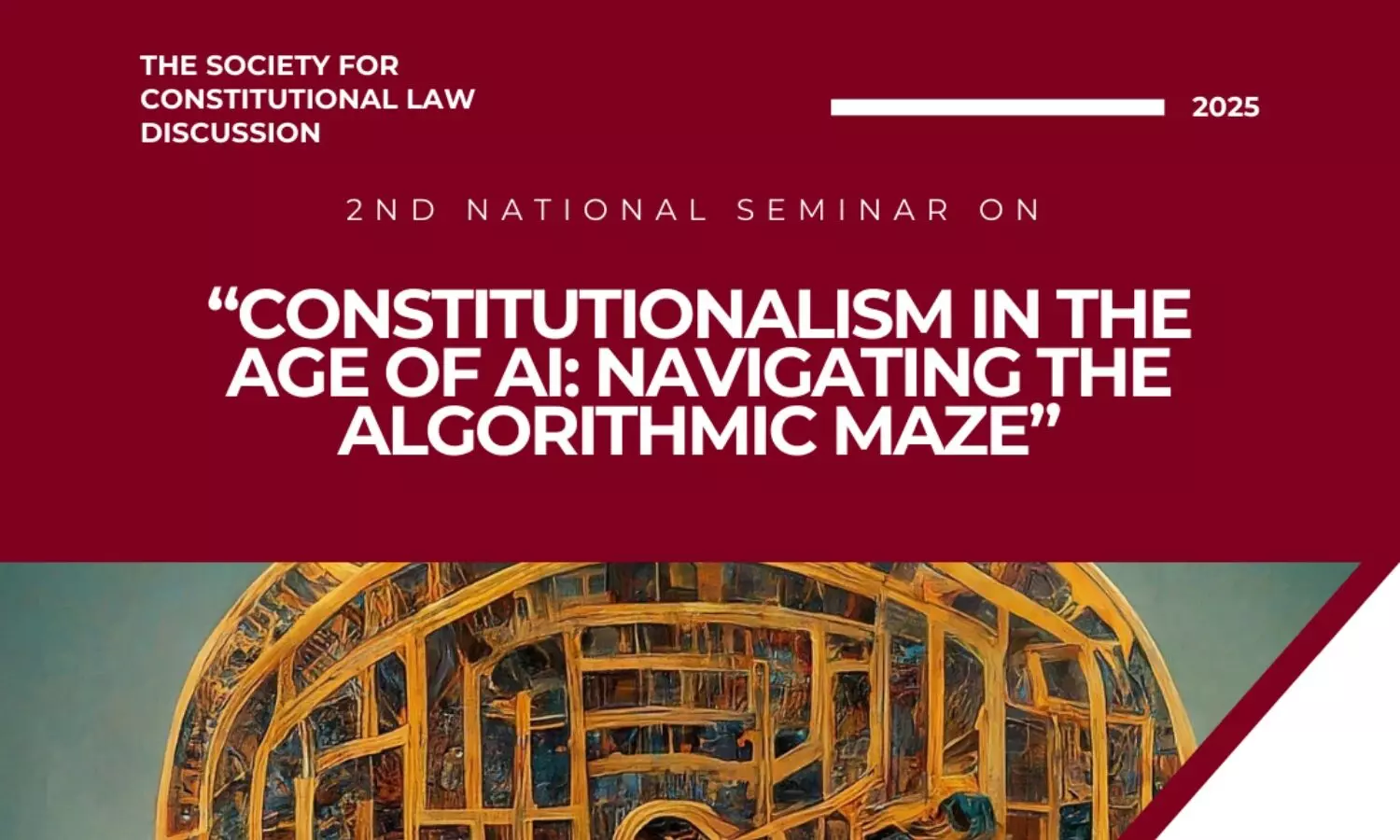2nd National Seminar on Constitutionalism in the Age of AI | The Society For Constitutional Law Discussion
TSCLD is hosting an online National Seminar on Constitutionalism in the Age of AI. Scroll down for more details!

The Society For Constitutional Law Discussion (TSCLD) is hosting an online National Seminar on Constitutionalism in the Age of AI: Navigating the Algorithmic Maze, open for submissions until March 25th, 2025.
About The Society For Constitutional Law Discussion
In order to develop the culture of legal writing and discussion, some of the students of the Chanakya National Law University, Patna of Batch 2018-2023 came up with the idea of starting The Society For Constitutional Law Discussion. This Society vides its blog and Journal (JCS) serves as a brilliant platform for the students to engage in constitutional law discussions and writing with their peer group. It was also ranked as one of the best constitutional law blogs by Feedspot of 2024.
Concept Note
The rapid advancement of Artificial Intelligence (AI) presents unprecedented opportunities and challenges globally, and India is no exception. While AI holds immense potential to transform various sectors in India, from governance and healthcare to education and agriculture, it also raises profound constitutional questions that demand careful consideration.
This seminar aims to explore the complex interplay between AI and constitutional principles within the Indian context, examining how existing legal frameworks can be adapted or reimagined to address the unique challenges posed by AI technologies in India. Recent developments, such as the ongoing discussions around data protection legislation, the increasing use of AI in government services, and concerns about algorithmic bias, make this topic particularly relevant for India today.
Sub-Themes
1. AI and Human Rights
- The Right to Privacy and AI Surveillance: Exploring the implications of AI surveillance systems on privacy rights in India.
- AI in the Judicial System: Examining how AI tools can affect the right to a fair trial and due process.
- AI and Discrimination: How AI algorithms can perpetuate or mitigate discrimination in areas like hiring, education, and criminal justice.
- Freedom of Expression vs. AI Censorship: The balance between AI-driven content moderation and the fundamental right to freedom of speech and expression.
2. AI and Social Policy
- AI in Public Welfare and Policy-making: How AI is transforming social welfare programs, poverty alleviation, and healthcare delivery in India.
- AI in Employment and Labor Laws: Addressing the impact of AI on employment rights, job displacement, and the future of work.
- AI in Education and Equal Access: The role of AI in education, its potential to promote or hinder equal access to quality education, and constitutional safeguards.
- Ethical Implications of AI in Social Welfare: Analysing the ethical concerns surrounding the use of AI in areas like child welfare, health policy, and public safety.
3. AI and Governance
- AI in Public Administration: Assessing how AI tools can help streamline governance and improve transparency in decision-making.
- AI and Data Protection Laws: The role of AI in processing sensitive data and the constitutional implications on data privacy.
- AI and Accountability in Government: Who is responsible when AI systems make decisions that affect citizens’ rights and liberties? The role of governance in ensuring accountability.
- AI, E-Governance, and Citizen Rights: The impact of AI on government transparency, access to justice, and citizens' rights in India.
4. AI and the Future of Constitutional Interpretation
- AI and Judicial Overreach: Should AI tools be used in judicial decision-making, and what impact might this have on judicial independence and constitutional interpretation?
- AI and the Changing Role of Legislatures: Exploring how AI might influence legislative processes, including policymaking and constitutional amendments.
- AI in Legal Education and Research: The role of AI in shaping legal practice, from legal research to case predictions, and its constitutional implications.
5. AI and Fundamental Rights
- AI and the Right to Equality: Can AI lead to biases in government policies, and how does this impact the right to equality guaranteed by the Indian Constitution?
- AI, Safety, and the Right to Life: How AI advancements, like autonomous vehicles or healthcare AI, may interact with the right to life and personal safety.
- AI in Law Enforcement and Constitutional Safeguards: The balance between security and personal freedoms when AI is used in policing, surveillance, and intelligence gathering.
Note: The list is only indicative and not exhaustive. Any other topic related to the Seminar theme may also be submitted.
Submission Guidelines
The participants are required to adhere to the following guidelines:
- The abstract shall not be more than 300 words. Abstracts must be submitted by the specified deadline. The abstract should be original and not published elsewhere. The selection committee's decision on abstract acceptance is final.
- The abstracts will be peer-reviewed by the Editorial Board and only shortlisted abstracts will be invited to submit final papers as well to present them in the Seminar. The final paper should be submitted after the intimation of acceptance of the abstract.
- Authors of accepted abstracts must submit their full papers by the designated deadline. Full papers should conform to the submission guidelines of the Journal (JCS) available here and must be the original work of the author(s).
- The submission should be only mailed in either of the file formats, i.e., .doc OR .docx. No other format shall be accepted.
- All (final) submissions should be uploaded only in the Google Form with a separate cover letter indicating:
- Name of the Author(s),
- Institutional Affiliation,
- Email address,
- Contact Number (preferably WhatsApp) and,
- Topic of the paper.
- During submission of the final paper, the title of the manuscript must contain “2nd Seminar – Final Paper Submission_Title of the Paper”.
- The full paper shall not exceed 5000 words (excluding footnotes). It shall be typed in Palatino Linotype, Font Size 12 on A4 size paper on any of the sub-themes of the conference with a 1” margin on all sides with 1.5 line spacing using MS Word.
- Format: Submission must be in Palatino Linotype, font size- 12, justified and with 1.5 line spacing, Paper size: A4 Sheet with a margin of 1 inch. The heading should be in Palatino Linotype, Font Size 14, Bold, 1.5 line spacing, center-aligned, while the sub-heading should be in Palatino Linotype, Font Size 13.
- Footnotes must be in Palatino Linotype, Font Size 10, with 1.0 spacing.
- A maximum of two authors is allowed. The co-authored paper should give the aforementioned details about both authors.
- The authors shall strictly adhere to the ILI Citation format for reference [Click here to view].
- Similarity up to a maximum of 10% is permitted.
- By submitting an abstract and paper, authors grant the organizing committee the right to publish the material in seminar-related publications.
Eligibility
Students, Legal professionals, Academicians, researchers, Policymakers, and enthusiasts of constitutional law
Confirmation of Participation
Participants must confirm their intention to present their paper at the seminar. Failure to confirm participation may result in the exclusion of the paper from the seminar program.
Venue
Online
Presentation Guidelines
Presenters whose abstracts are selected for full paper submission will be assigned a specific presentation time, which they must adhere to. Presentations must be consistent with the submitted abstract and paper.
Certificates
Certificates of participation will be provided to all registered participants. Certificates of presentation will be issued to authors presenting their papers.
Publication
Selected papers will be published either in the journal or in a book containing an ISBN.
Important Dates
- Abstract Submission Last Date: 15th March 2025
- Intimation regarding Abstract Selection/Rejection: 15th March 2025
- Last Date of Fee Payment: 25th March 2025
- Last Date of Full Paper Submission: 25th March 2025
- Date & Time of Presentation: 06th April 2025. [Time to be notified later]
Registration Fee
Registration fee for this seminar (to be payable only after abstract acceptance) is:
- Single Author: Rs. 600/-
- Co-Authorship (Two Authors): Rs. 900/-
The registration fee is non-refundable.
Registration
Interested participants can register and submit their abstracts using the online registration form available here.
Abstract Submission
- The abstract should be submitted via the online form available below. No other means of Abstract submission will be accepted.
- [Click here to Submit]
- Authors whose abstracts are accepted for presentation will receive a link to submit their final papers on their registered email.
Downloads
Brochure: [Click here to view]
Contact
In case of any queries or suggestions, do not hesitate to contact the undersigned:
Mr. Ayush Agrawal, Core Team Member
- Email: [email protected].

